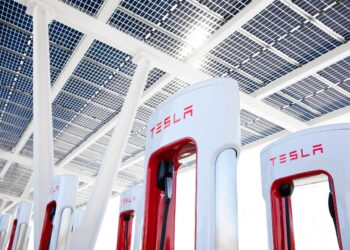German automaker Volkswagen Group is deep-diving into the semiconductor supply chain to improve its position in terms of technology and competitiveness in the global car market. Volkswagen’s semiconductor strategy could provide a strong foundation for the German company’s electric vehicle lineup.
VW plans to reorganize how it procures electronic parts and semiconductors so it can ensure supply in the long term. Part of the company’s strategy is to develop a high degree of transparency in its semiconductor supply chain.
“A high degree of transparency in the semiconductor value chain – the exact knowledge of the parts used – enables us to better determine the global demand and availability of these components,” said Dirk Große-Loheide, a VW Board Member for Procurement and member of the Group’s management.
Volkswagen will be working closer with its Tier 1 suppliers moving forward. In the past, Tier 1 suppliers were free to decide which parts to use in electronic components like control units. Under VW’s new strategy, the German automaker will collaborate with Tier 1 suppliers and specify which semiconductors and electronic parts to use in its vehicles. Volkswagen also plans to purchase semiconductors directly from manufacturers, as noted in a press release.
“Furthermore, the transparency regarding semiconductors means that technical alternatives can be identified and implemented more quickly in the event of bottlenecks. Another positive effect is that a reduction in the diversity of variants in the hardware results in a lower degree of software complexity,” said Karsten Schnake, VW Board Member of Procurement at Škoda Auto and head of the cross-brand and cross-functional task force Cross Operational Management Parts & Supply Security (COMPASS).
The high demand for semiconductors became widely apparent during the Covid-19 pandemic. The use of semiconductors and electronic components in modern vehicles has increased, especially as the global car market transitions to electric vehicles equipped with far more technology than the average point-A-to-point-B car.
Volkswagen seems to be adopting Tesla-like moves to survive and thrive during the semiconductor shortage. During the pandemic, Tesla dived deeper into the semiconductor supply chain, going as far as developing 19 microcontrollers in-house. At the time, Tesla also worked closer with its chip suppliers.
The Teslarati team would appreciate hearing from you. If you have any tips, contact me at maria@teslarati.com or via X @Writer_01001101.









